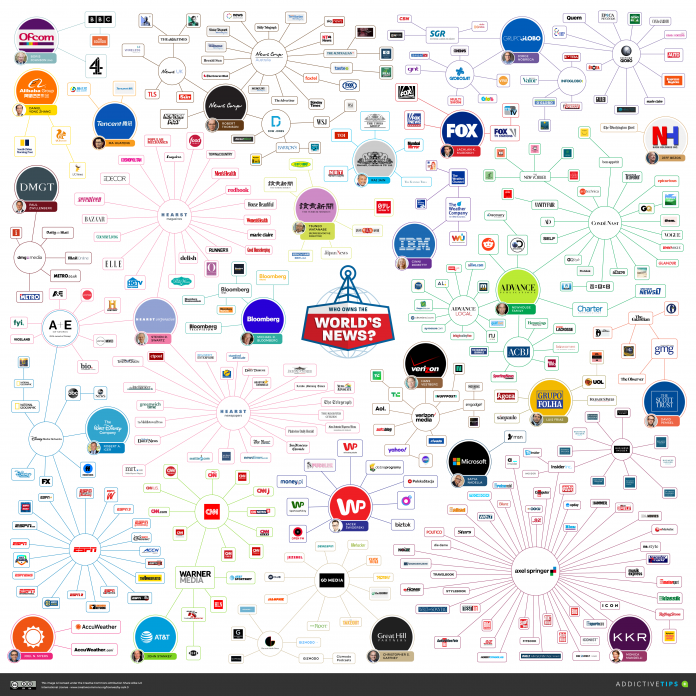Have you ever really thought about where you get your news from? In these politically divisive times, we are fed so many different opinions and takes on events that it’s hard to know what is real and what is fake news. This can be so damaging to the brand you’ve built up for yourself. The media has a lot of power to shape the way we view the world because it is the prism that so many of us see it through. However, if we do not understand who owns the news, we can not know what influences and motivations are behind how that news is presented to us.
When you see a journalist on the TV or read an article in a newspaper or online, you can hope that they are presenting their report on whatever has happened objectively, with no agenda behind how it is represented. But is that really the case? Between the event happening and the report getting to you, who has had their say on it internally at the news organization? Their editor? Their editor’s boss? The owner of the corporation that owns the news organization? No wonder Americans don’t trust the media anymore.
You’ll have heard of at least one media mogul and the power and influence that he wields over domestic and international affairs in the USA, UK and Australia. This person is, of course, Rupert Murdoch. His media outlets seem to have the power to determine what is on the political agenda in these countries, broadcasting their owner’s views to millions of voters. In the 1992 UK election, his The Sun newspaper boasted “It’s The Sun Wot Won It” after relentlessly backing the Conservative party despite polls suggesting the Labour party would win.
His News Corp (originally News Corporation) and Fox brands unsurprisingly feature strongly in these images, starting with the global picture. Even if there’s organizations that appear to have greater numbers of media outlets, the power and influence of the Murdoch brands cannot be overstated. Other big corporations that feature include Disney, Microsoft, IBM, Warner and Hearst. All of these corporations have a big say on the news, whether it’s politics, sports, entertainment or culture.
There’s no doubt that the internet age has changed the way we consume the news and that this has been reflected by the ownership of that news (as seen by the presence of some of the tech giants mentioned above). At first, the internet seemed that it might bring more a democratic approach to how our news was owned, but even this market has become more and more consolidated over the last couple of decades.
The Columbia Institute for Tele-Information research center did a recent study which found that the market concentration of internet media has more than doubled since 2000. They looked at 30 countries, and found that, on average, the top four media companies in each country hold 40% of its media content market. This is a long way from the Wild West early days of internet news and this trend is only likely to continue.
We’ve seen in recent years how Disney has bought up more and more media properties. From Marvel Comics to 20th Century Fox, bringing it all together in its Disney+ streaming service in a bid to displace Netflix in that market purely through the power of its intellectual properties. This consolidation of assets is being played out all the time in the news markets too, with corporations and media moguls in a power struggle with each other that we might not be aware of, but are definitely affected by.
If you’ve set up your own blog from home and have managed to build it into a brand with national or global audiences and influence, the temptation has to be there to cash in on interest from these businesses as a reward for your hard work. Is there a risk that our media is becoming too controlled by so very few organizations and the people who control them? Can we trust the news when it comes filtered through the views, biases and desires of the rich and powerful?
It’s a question that really is shaping the world we live in today, so why not have a good look at these images and see where you get your news from — and who owns them. You may find that the answer surprises and concerns you.
Find a Home-Based Business to Start-Up >>> Hundreds of Business Listings.

















































